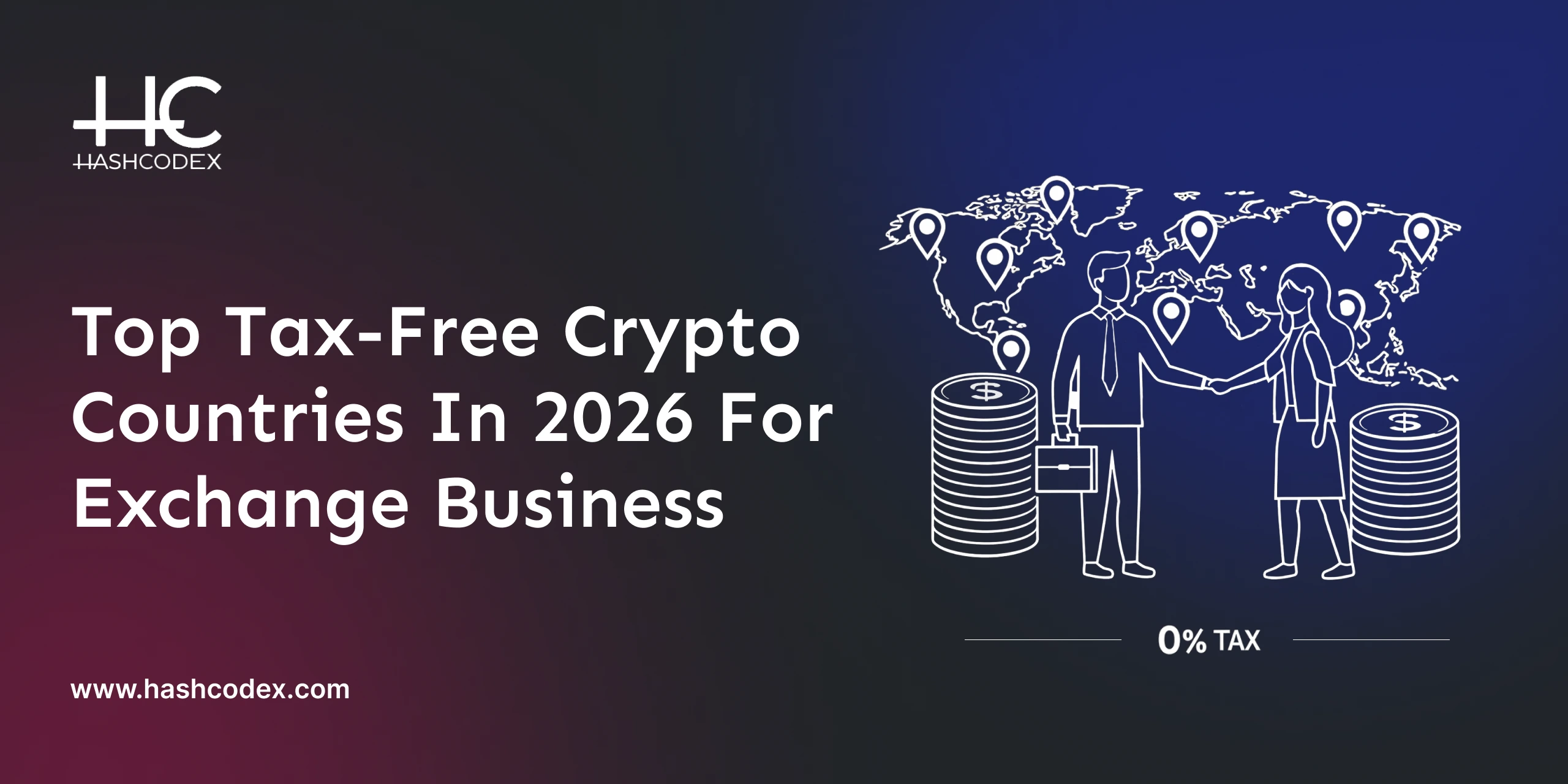Have you ever imagined what is common among leading exchanges like Binance, OKX, and Bybit?
The bigger profits they’re getting from crypto derivatives.
While traders look at crypto derivatives as a tool, entrepreneurs see them as an opportunity. Derivatives increase volume, revenue, active traders, and liquidity, which is why every major exchange is currently adding or scaling derivatives.
If you’ve plans to build a crypto platform or enter this market as an entrepreneur, then knowing about derivatives is important.
But not all derivatives are the same; there are different types of crypto derivatives which are built according to your business needs.
In this blog, we’ll explain those types most simply, so that you can choose the right type for your business. Let’s get started!
What are Crypto Derivatives?
Crypto derivatives are agreements about the future price of a cryptocurrency. You don’t buy the coin itself, you just make a deal based on what you think its price will be.
For example:
Imagine you want to rent a house next year.
You and the owner agree today on the rent price for next year.
Even if the market rent goes up or down later, your deal is fixed.
That is how a futures contract works in crypto. You lock in a price today for a trade that will happen in the future.
Types of Crypto Derivatives: A Complete Guide
Crypto derivatives have different types like perpetual swaps, options, and futures contracts, all allow traders to bet on future prices, but the usage differs. Let’s have a look:
Perpetual Futures
Perpetual futures work similarly to regular futures, but with one important difference: they never expire. Traders can maintain the position for as long as they desire.
To maintain perp prices near the true market price, exchanges use a funding rate mechanism in which long and short traders compensate each other depending on market imbalance. This maintains the contract price consistent with spot rates.
Why they matter:
Perps are the most widely traded crypto derivative today, generating huge liquidity, constant engagement, and regular funding fees.
Options Contracts
Options provide the buyer the right (but not the obligation) to buy or sell a cryptocurrency at a fixed price before or on a certain date.
- Call option = the right to buy later.
- Put option = the right to sell later.
Buyers pay the seller a premium for this flexibility. If the market turns against them, they may simply walk away, losing only the premium.
Why they matter:
Options attract traders seeking strategy and flexibility without full risk, expanding your customer base beyond futures traders.
Futures Contracts
Futures contracts are agreements to buy or sell a cryptocurrency at a set price on a future date. Traders can go:
- Long - to profit if prices rise.
- Short - to profit if the price drops.
Before a futures contract expires, both parties may end the trade early by selling or purchasing it back.
Why they matter:
Futures generate high volume and attract expert traders, resulting in increased revenue for exchanges.
Swaps
Swaps are agreements that exchange cash flows or assets according to the value of an actual cryptocurrency. In DeFi, this often occurs as:
- Token swaps on decentralized exchanges (DEXs)
- Interest rate swaps in lending processes.
- Cross-asset swaps (BTC-ETH exposure without selling)
Many cryptocurrency swaps settle in stablecoins or native tokens instead of fiat currencies.
Why they matter:
Swaps enable on-chain derivatives markets and DeFi-native revenue models, like liquidity fees and protocol rewards. New plans. New projects. New results. Or just another scroll
session. You choose the story.
Steps to Build Your Own Crypto Derivatives
Building a crypto derivatives platform requires more than just code; it also involves business planning, legislation, technology, security, and a launch strategy. Here is a basic, step-by-step guide for businesses:
Step 1: Plan Your Product and Business Model
Start by selecting which kind of derivatives you will offer: futures, perpetuals, options, swaps, or a combination. Then decide how you'll generate money (by trading fees, funding fees, subscriptions, or margin interest).
Next, select your platform style.
- Centralised Exchange (CEX): Faster, with full control, but you manage custody, KYC, and regulations.
- Decentralized Exchange (DEX): Operates on smart contracts without a middleman, is more transparent, but requires more effort to set up and audit.
Conduct market research. Examine leaders like Binance, Bybit, Deribit, and GMX. Assess which gaps or niches your platform can serve, like retail traders, institutions, DeFi customers, or a hybrid market.
Step 2: Handle Legal and Regulatory Requirements
Derivatives are one of the most regulated sectors of cryptocurrency. Consult legal professionals before getting started.
- Determine where you will operate and who your users are.
- Ensure KYC and AML compliance.
- Obtain licenses if necessary (for example, CFTC, FinCEN in the United States).
Ignoring compliance can destroy a business later, even after it has launched; don't skip this phase.
Step 3: Build the Technology Stack and Security
Choose Ethereum, Solana, Polygon, Arbitrum, or another blockchain based on speed, costs, and ecosystem.
Create or integrate core components:
- Matching/Trading Engine (CEX) or Smart Contracts (DEX).
- Risk and liquidation logic for margin and leverage.
- UI/UX for web and mobile, including real-time charting and trading tools.
- Wallet and backend systems for deposit, withdrawal, and balances.
- Liquidity sources for market makers or exchange integrations.
Security should not be optional:
- Multisignature and cold storage for funds.
- Two-factor authentication, encryption, and DDoS protection.
- Smart contract audits and bug bounty schemes.
Step 4: Launch, Grow, and Keep Improving
Before going to launch, do thorough stress tests, security audits, and beta testing with actual users.
Then, develop a marketing strategy that includes partnerships, community building, influencers, or educational initiatives. Once set up, provide great customer support to build trust.
After launch, continue to deliver updates: add new derivative products, increase liquidity, strengthen features, and maintain compliance.
Advantages of Launching a Crypto Derivatives Platform
Launching a crypto derivatives platform allows you to attract top traders and institutions while also providing users with more efficient methods to trade, hedge risks, and expand with less funding. It's a quick path to exchange growth.
Earn more in different ways
Platforms for derivatives depend on more than just trading fees. You can profit from interest rates on perpetuals, trading on margin and leverage, and even liquidation fees. This results in a stronger and consistent business than a traditional exchange.
Win serious traders and stand out
You can attract institutions and professional traders by providing advanced tools; these users will trade more and stay longer. This increases brand loyalty and gives you an advantage over simple exchanges.
Reach a fast-growing market
Globally, cryptocurrency derivatives are expanding. Institutions and hedge funds are becoming major players. There is still a need for new platforms to take part in this growing industry.
Space to lead and develop
The crypto derivatives space is always changing. You may include features like cross-chain features, AI trading bots, perpetual futures for new currencies, and more to make your platform unique and up to date.
Reach users globally
Cryptography is, by nature, worldwide. By attracting traders and liquidity from many nations, a derivatives platform can increase volume and help you become a powerful competitor in the world.
Risks of Starting a Crypto Derivatives Business
Starting a crypto derivatives business is a little risky. Rules change often, and prices fluctuate quickly. But it can be solved by regular maintenance and security checks. Let’s look at those business risks in detail:
Financial & Market Risk
The price of cryptocurrencies varies greatly. Leverage may cause large liquidations and wipe out traders with a single, small move. The market as a whole could drop, and the platform may be severely impacted when several positions fall simultaneously.
Legal & Compliance Risk
Crypto regulations vary from country to country and are not always clear. Even if a platform is legal now, it can be illegal tomorrow. Also, strict KYC and AML procedures are expensive, and any error might result in penalties or closure.
Tech & Security Risk
Crypto platforms are frequently a target of code vulnerabilities and hackers. Millions can be lost with no way to recover from a single bug or security issue. In a 24/7 industry, even a short interruption can result in huge losses and frustrated clients.
Brand & Trust Risk
Crypto continues to struggle with a negative reputation due to hacks, scams, and collapsed exchanges such as FTX. If users notice any signs of manipulation, lack of service, or delays, even a clean platform might quickly lose their trust.
Crypto derivatives can help you expand your business fast, but only if you can manage the risk, maintain compliance, and gain the trust of users daily.
Conclusion
Crypto derivatives are not only for traders; they’re a huge opportunity for businesses that innovate.
Futures, swaps, options, and perpetuals give access to advanced trading products, new income sources, and better methods of attracting and retaining traders. As an entrepreneur, understanding the types is your first step towards building a platform.
If you want to beat the competitor with these types, you should hire a professional to develop a crypto derivatives exchange. The right partner delivers the right tool.
Here’s where Hashcodex enters. We specialized in crypto derivatives exchange development and offering various services. Whether you want to build it from scratch or use a white-label solution, our skilled developers will always be ready to understand your needs and deliver it on time.
Let’s build an innovative tool together. Hire us!











